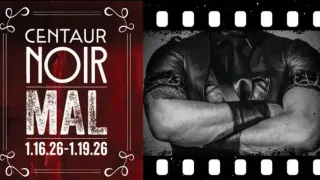November 27, 2022
Review: 'Flaming Ears' is a Dystopian Pop Sci-fi Lesbian Extravaganza
Laura Moreno READ TIME: 5 MIN.
Filmed in Austria in 1991, "Flaming Ears" is truly an underground film. Highly acclaimed for its endlessly disruptive narrative –almost to the point of rendering it incomprehensible. It also calls to mind the fiction of UK writer J.G. Ballard.
Originally shot on Super 8 film, the newly restored film had to be reconstructed from prints after the original negatives and sound recordings were lost.
Far, far into the future among the ruins of the once-great city of Asche (pun intended) live three women. Meet Spy (Susana Helmayr), a closet comic book artist; Volley (co-director Ursula Pürrer), a pyromaniac and sex addict who laughs maniacally as she burns Spy's printing press, destroying her one creative outlet; and Nun (co-director Angela Hans Scheirl), an alien who wears red vinyl and has a thing for reptiles, and steps in to protect Spy although she has no earthly concept of right and wrong. Nun is also Volley's lover.
Seeking revenge, Spy immediately bolts to the lesbian club where Volley performs. But just as she arrives, she is seriously injured in a fight outside the club and lies helpless in the street until Nun rescues her, taking her home to hide her from Volley. This is the sum total of the discernable plot.
Low-tech, High Camp
The grainy, lo-fi film drifts almost joyfully over the edge into explicit sex, references to fetish practices (such as objectum sexuality, which is an attraction to inanimate objects, like the woman who married the Berlin Wall), even going into outright disgusting territory.
The three directors – Ursula Pürrer, Angela Hans Scheirl, and Dietmar Schipek – with the smallest of budgets, clearly anticipated the film would not have much of an audience to offend. This is no hedonistic lesbian club in the tradition of Ancient Greece and Rome. Earth's once-invincible civilization is now in shambles, and so are the people who populate this post-apocalyptic world.
But the film's saving grace is that it is filmed in such low lo-tech that the scenes are not really realistic enough to be very offensive, even if they seek to be, and can be enjoyed as thoroughly campy. A bloody murder scene comes off as cheesy, with blood so fake it ends up mocking any attempt at seriousness.
The film mirrors how the great USSR must have looked in 1991, particularly to its near neighbors like Austria: Unconquerable one day, and gone the next. The whole thing in retrospect seems to have been only make-believe.
Interestingly, Volley wears pigtails and roller skates (like a juvenile) and sports a white head decoration that mimics weird cat ears on the sides of the back of her head (rather than on top, like a cat), but is reminiscent of both Mickey Mouse and the ultra-weird police hat of Franco's Fascist Spain, still worn today by the Guardia Civil. The subtle message seems to be: Meet your new (immature) dictator.
The film score? Early German techno music, of course, featuring a dark and hard-driving robotic bass.
Moreover, this film, as in "Blade Runner," contains a surprising number of references to religion. In this case, not transcendent Buddhism, but reminders of the tyrannical hierarchy (or ex-hierarchy) and accoutrements of Roman Catholicism are present alongside arson and various forms of immodesty.
Far-fetched, or Not
The narration and often head-scratching dialogue shatter all the typical rules. They are strangely disconnected from everything, including from the cannon of literature and film. The voiceover states, "Highly unlikely for a pure heart to survive," and we see a person gunned down, which goes against the grain of the traditional hero and heroine, who is almost always a worthy character.
Ever since storytelling began, a pure heart is a rare advantage: David and Goliath, Snow White and the Evil Queen, Maria Von Trapp and the conniving Baroness, and also an endless number true stories that happened during WWII that do not seem to have made their way to the GenX ears of the Austrian directors, which may not be as far-fetched a notion as it seems.
The memories of World War II and the partitioning of that part of Europe that followed were still quite raw at the time; they seem to be the elephants in the room that inform the sensibilities of the film, all that it upends, and all that it embraces. Ultimately, it can be read as a plea for acceptance and love in a very odd time at the close of the Cold War.
"Flaming Ears" is a full-blown anti-romantic rebellion, with a DIY creative quality that makes the world of the film a creative utopia even as it exists in a dystopian world.
"Flaming Ears" screens Nov. 30 - Dec. 2, 2002 at the Alamo Drafthouse San Francisco, 2550 Mission Street, and can be rented online. www.kinolorber.com
Help keep the Bay Area Reporter going in these tough times. To support local, independent, LGBTQ journalism, consider becoming a BAR member.






